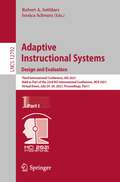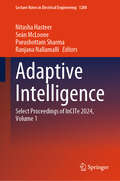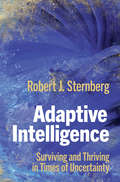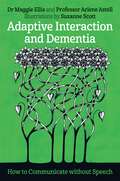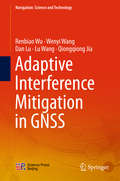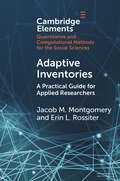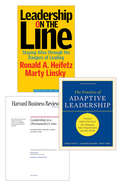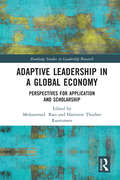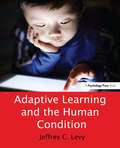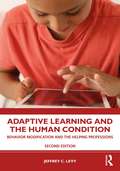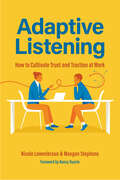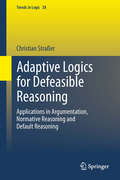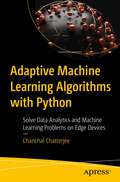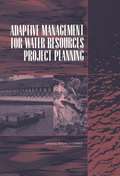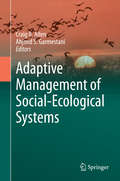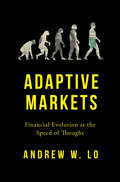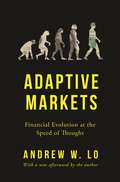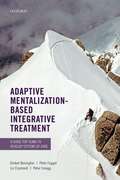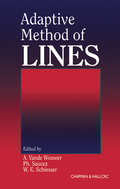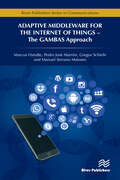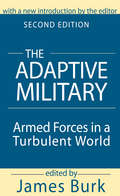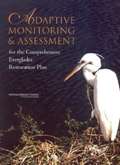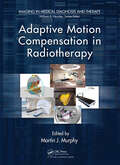- Table View
- List View
Adaptive Instructional Systems. Design and Evaluation: Third International Conference, AIS 2021, Held as Part of the 23rd HCI International Conference, HCII 2021, Virtual Event, July 24–29, 2021, Proceedings, Part I (Lecture Notes in Computer Science #12792)
by Jessica Schwarz Robert A. SottilareThis two-volume set LNCS 12792 and 12793 constitutes the refereed proceedings of the Third International Conference on Adaptive Instructional Systems, AIS 2021, held as Part of the 23rd International Conference, HCI International 2021, which took place in July 2021. Due to COVID-19 pandemic the conference was held virtually.The total of 1276 papers and 241 poster papers included in the 39 HCII 2021 proceedings volumes was carefully reviewed and selected from 5222 submissions. The regular papers of AIS 2021, Part I, are organized in topical sections named: Conceptual Models and Instructional Approaches for AIS; Designing and Developing AIS; Evaluation of AIS; Adaptation Strategies and Methods in AIS.
Adaptive Intelligence: Select Proceedings of InCITe 2024, Volume 1 (Lecture Notes in Electrical Engineering #1280)
by Nitasha Hasteer Seán McLoone Purushottam Sharma Ranjana NallamalliThis book comprises the select peer-reviewed proceedings of the 4th International Conference on Information Technology (InCITe-2024). It aims to provide a comprehensive knowledge base encompassing state-of-the-art research and development in adaptive intelligence, decision intelligence, artificial intelligence, deep learning, machine learning, data science, and enabling technologies for IoT, blockchain, and other futuristic technologies. It covers various topics that span cutting-edge, collaborative technologies and areas of computation. The content would serve as a rich knowledge repository on information & communication technologies, neural networks, fuzzy systems, natural language processing, data mining & warehousing, big data analytics, cloud computing, social networks, and intelligence, decision-making, and modeling, information systems, IT architectures, and security related aspects. This book provides a valuable resource for those in academia and industry.
Adaptive Intelligence: Surviving and Thriving in Times of Uncertainty
by Robert J. SternbergAdaptive Intelligence is a dramatic reappraisal and reframing of the concept of human intelligence. In a sweeping analysis, Robert J. Sternberg argues that we are using a fatally-flawed, outdated conception of intelligence; one which may promote technological advancement, but which has also accelerated climate change, pollution, the use of weaponry, and inequality. Instead of focusing on the narrow academic skills measured by standardized tests, societies should teach and assess adaptive intelligence, defined as the use of collective talent in service of the common good. This book describes why the outdated notion of intelligence persists, what adaptive intelligence is, and how it could lead humankind on a more positive path.
Adaptive Interaction and Dementia: How to Communicate without Speech
by Dr Maggie Ellis Professor Arlene Astell Suzanne ScottThis guide to Adaptive Interaction explains how to assess the communication repertoires of people with dementia who can no longer speak, and offers practical interventions for those who wish to interact with them. Outlining the challenges faced by people living with advanced dementia, this book shows how to relieve the strain on relationships between them, their families, and professional caregivers through better, person-centred communication. It includes communication assessment tools and guidance on how to build on the communication repertoire of the individual with dementia using nonverbal means including imitation, facial expressions, sounds, movement, eye gaze and touch. With accessible evidence and case studies based on the authors' research, Adaptive Interaction can be used as the basis for developing interactions without words with people living with dementia.
Adaptive Interference Mitigation in GNSS (Navigation: Science and Technology)
by Lu Wang Renbiao Wu Wenyi Wang Dan Lu Qiongqiong JiaThis book introduces readers to adaptive interference mitigation techniques based on multiple antennas for global navigation satellite systems (GNSS) in the time, domain, spatial and spatial-temporal domains. As the performance of GNSS can easily be impacted by various intentional and unintentional interferences, the book explores in detail various types of interference, including jamming , high dynamic jamming, spoofing, multipath and pulsed interference. It offers a valuable reference work for graduate students and engineers in the field of satellite navigation and signal processing.
Adaptive Inventories: A Practical Guide for Applied Researchers (Elements in Quantitative and Computational Methods for the Social Sciences)
by Jacob M. Montgomery Erin L. RossiterThe goal of this Element is to provide a detailed introduction to adaptive inventories, an approach to making surveys adjust to respondents' answers dynamically. This method can help survey researchers measure important latent traits or attitudes accurately while minimizing the number of questions respondents must answer. The Element provides both a theoretical overview of the method and a suite of tools and tricks for integrating it into the normal survey process. It also provides practical advice and direction on how to calibrate, evaluate, and field adaptive batteries using example batteries that measure variety of latent traits of interest to survey researchers across the social sciences.
Adaptive Leadership: The Heifetz Collection
by Ronald A. Heifetz Marty Linsky Alexander GrashowIn times of constant change, adaptive leadership is critical. This Harvard Business Review collection brings together the seminal ideas on how to adapt and thrive in challenging environments, from leading thinkers on the topic-most notably Ronald A. Heifetz of the Harvard Kennedy School and Cambridge Leadership Associates.The Heifetz Collection includes two classic books: Leadership on the Line, by Ron Heifetz and Marty Linsky, and The Practice of Adaptive Leadership, by Heifetz, Linsky, and Alexander Grashow. Also included is the popular Harvard Business Review article, "Leadership in a (Permanent) Crisis," written by all three authors. Available together for the first time, this collection includes full digital editions of each work.Adaptive leadership is a practical framework for dealing with today's mix of urgency, high stakes, and uncertainty. It has been used by individuals, organizations, businesses, and governments worldwide. In a world of challenging environments, adaptive leadership serves as a guide to distinguishing the essential from the expendable, beginning the meaningful process of adaption, and changing the status quo.Ronald A. Heifetz is a cofounder of the international leadership and consulting practice Cambridge Leadership Associates (CLA) and the founding director of the Center for Public Leadership at the Harvard Kennedy School. He is renowned worldwide for his innovative work on the practice and teaching of leadership. Marty Linsky is a cofounder of CLA and has taught at the Kennedy School for more than twenty-five years. Alexander Grashow is a Senior Advisor to CLA, having previously held the position of CEO.
Adaptive Leadership in a Global Economy: Perspectives for Application and Scholarship (Routledge Studies in Leadership Research)
by Mohammed RaeiWith the entire world experiencing the global pandemic and its aftermath, VUCA (Volatile, Uncertain, Complex, and Ambiguous) conditions have never been more extreme and the need for adaptive leadership never more urgent. But how is adaptive leadership applied outside Western cultures? How can it be taught through leadership development programs? Which tools enhance its practice and its teaching? How does adaptive leadership relate to other key theories and practices? This volume answers these questions and more as it illustrates how adaptive leadership practices address some of the world’s most pressing challenges-political and cultural division, remote work, crisis management-across a variety of sectors. Adaptive leadership has been explained as a key leadership approach for dealing with adaptive, as distinguished from technical or predictable, problems, especially prevalent in complex environments. However, adaptive leadership scholarship has suffered from a lack of conceptual clarity and casual application of its core concepts. It remains solidly Western in its prescriptions. This book will expand readers’ understanding of adaptive leadership and its potential to solve local and global adaptive challenges and will explore its relevance and application to cultures outside the United States. Aiming to increase conceptual clarity about adaptive leadership to enhance future scholarship and application and illustrate novel approaches and perspectives, this book will be of interest to researchers, academics, practitioners, and students in the fields of leadership, strategy, and organizational studies.
Adaptive Learning and the Human Condition
by Jeffrey C. LevyAdaptive Learning and the Human Condition presents the basic principles of classical (Pavlovian) and instrumental (Skinnerian) conditioning in a more coherent and expansive manner than is the case in other textbooks. Learning is defined as an adaptive process through which individuals acquire the ability to predict, and where possible, control the environment. This overarching definition enables integration of traditional Pavlovian and Skinnerian principles and terminology and makes explicit why treatment of the learning process is essentially limited to these two historical research paradigms. Pavlov developed a methodology for studying animals under circumstances where they could predict, but not control, sequences of environmental events. Skinner studied animals under circumstances where their behavior had an effect upon environmental events. Observational learning and symbolic communication (i.e., spoken or written language) are incorporated as indirect learning processes through which individuals can acquire the ability to predict or control. This treatment creates a perspective within which it is possible to consider the fundamental nature of the learning process in understanding the human condition and in addressing significant individual and social concerns. Examples of applications and issues not included in similar textbooks include: The role of classical and instrumental conditioning in language acquisition The administration of rewards and punishers in Baumrind’s parental styles as related to Kohlberg’s stages of moral development Stone-Age hunter-gatherer and technologically-advanced cultures: How did we get from there to here? Self-control and self-actualization While covering traditional technical and theoretical issues, the book is written in a clear, engaging style. The narrative builds across chapters, culminating in the treatment of applications and societal concerns of import and interest to students and faculty alike. Upon completing this book, readers should be able to: explain the significance of human condition through adaptive learning; present the basic principles of classical and instrumental conditioning; and understand the significance of scientific research
Adaptive Learning and the Human Condition: Behavior Modification and the Helping Professions
by Jeffrey C. LevyAdaptive Learning and the Human Condition provides a coherent and comprehensive introduction to the basic principles of classical (Pavlovian) and instrumental (Skinnerian) conditioning. When combined with observational learning and language, they are responsible for human accomplishment from the Stone Age to the digital age. This edition has been thoroughly updated throughout, relating adaptive learning principles to clinical applications as well as non-traditional topics such as parenting, moral development, and the helping professions. Defining learning as an adaptive process enables students to understand the need to review the basic animal research literature in classical and operant conditioning and consider how it applies to human beings in our everyday lives. Divided into four parts, this book covers historical research into psychology and adaptive learning, principles of adaptive learning (prediction and control), adaptive learning and the human condition, and behavior modification and the helping professions. The book showcases how an adaptive learning strategy can be practical, diagnostic, and prescriptive, making this an essential companion for psychology students and those enrolled in programs in professional schools and helping professions including psychiatry, special education, health psychology, and physical therapy.
Adaptive Listening: How to Cultivate Trust and Traction at Work
by Nicole Lowenbraun Maegan StephensThere Isn’t One Way to Listen. It’s Time to Adapt Your Listening!“Adaptive Listening is incredible. [It] made me evaluate all aspects of my interactions in life.” ─Workshop participant from Cisco#1 New Release in Running Meetings & Presentations and Human Resources & Personnel ManagementAdaptive Listening is for those who want to improve the way they, and their teams, communicate up, down, across, internally, and externally. Through engaging stories and practical techniques, discover a new model for listening in the workplace.Not just another book on communication. Adaptive Listening helps you up-level the under-trained side of communication amidst the realities of a hectic workday. Researched and tested exclusively in the work setting, Adaptive Listening moves you beyond active listening, embracing easy-to-remember techniques that strengthen relationships and get work done more effectively. Leaders at all levels can improve listening skills. Aspiring, emerging, and established leaders can build more awareness about their own listening style and the impact it has on their workday. Only then can they adapt the way they listen to meet the goals and needs of direct reports, peers, managers, customers, and stakeholders, all while contributing to a positive workplace culture.Inside learn:How to leverage the strengths and avoid the pitfalls of your listening style by recognizing how you prefer to process and respond to informationHow to break away from ineffective listening and step into Adaptive Listening to meet the goals and needs of the person speaking How to reduce mistrust, misalignment, and miscommunication by being more mindful of the barriers that prevent you from using empathetic communicationHow to cue other listeners to listen in the way you want and needIf you enjoyed You’re Not Listening, Just Listen, Listen Like You Mean It, Power Listening, Nonviolent Communication, or Crucial Conversations, you’ll love Adaptive Listening.
Adaptive Logics for Defeasible Reasoning: Applications in Argumentation, Normative Reasoning and Default Reasoning (Trends in Logic #38)
by Christian StraßerThis book presents adaptive logics as an intuitive and powerful framework for modeling defeasible reasoning. It examines various contexts in which defeasible reasoning is useful and offers a compact introduction into adaptive logics. The author first familiarizes readers with defeasible reasoning, the adaptive logics framework, combinations of adaptive logics, and a range of useful meta-theoretic properties. He then offers a systematic study of adaptive logics based on various applications. The book presents formal models for defeasible reasoning stemming from different contexts, such as default reasoning, argumentation, and normative reasoning. It highlights various meta-theoretic advantages of adaptive logics over other logics or logical frameworks that model defeasible reasoning. In this way the book substantiates the status of adaptive logics as a generic formal framework for defeasible reasoning.
Adaptive Machine Learning Algorithms with Python: Solve Data Analytics and Machine Learning Problems on Edge Devices
by Chanchal ChatterjeeLearn to use adaptive algorithms to solve real-world streaming data problems. This book covers a multitude of data processing challenges, ranging from the simple to the complex. At each step, you will gain insight into real-world use cases, find solutions, explore code used to solve these problems, and create new algorithms for your own use. Authors Chanchal Chatterjee and Vwani P. Roychowdhury begin by introducing a common framework for creating adaptive algorithms, and demonstrating how to use it to address various streaming data issues. Examples range from using matrix functions to solve machine learning and data analysis problems to more critical edge computation problems. They handle time-varying, non-stationary data with minimal compute, memory, latency, and bandwidth. Upon finishing this book, you will have a solid understanding of how to solve adaptive machine learning and data analytics problems and be able to derive new algorithms for your own use cases. You will also come away with solutions to high volume time-varying data with high dimensionality in a low compute, low latency environment. What You Will Learn Apply adaptive algorithms to practical applications and examplesUnderstand the relevant data representation features and computational models for time-varying multi-dimensional dataDerive adaptive algorithms for mean, median, covariance, eigenvectors (PCA) and generalized eigenvectors with experiments on real dataSpeed up your algorithms and put them to use on real-world stationary and non-stationary dataMaster the applications of adaptive algorithms on critical edge device computation applications Who This Book Is ForMachine learning engineers, data scientist and architects, software engineers and architects handling edge device computation and data management.
Adaptive Management For Water Resources Project Planning
by Panel on Adaptive Management for Resource StewardshipThis book reviews the Corps of Engineers' experiences to date with the concept of “adaptive management” and provides advice on additional and more effective implementation of this planning approach. The adaptive management concept itself is complex and evolving, but might be summarized as “learning while doing.” The book reviews literature on adaptive management and notes that a range of adaptive management practices present themselves for Corps projects. It is noted that there is no “cookbook” approach to adaptive management, and the book encourages the Corps of Engineers to continue to work with and learn from its applications of the concept. To facilitate institutional learning and to ensure that experiences are being employed across the agency, the book recommends that a Corps Center for Adaptive Management be established. The book also notes that greater involvement from the administration and Congress will be essential to successful adaptive management applications, as the Corps' efforts in this area will benefit from clarified water resources management objectives, the authority to manage adaptively, and from resources necessary for programs such as stakeholder collaboration and post-construction evaluations.
Adaptive Management of Social-Ecological Systems
by Craig R. Allen Ahjond S. GarmestaniAdaptive management is an approach to managing social-ecological systems that fosters learning about the systems being managed and remains at the forefront of environmental management nearly 40 years after its original conception. Adaptive management persists because it allows action despite uncertainty, and uncertainty is reduced when learning occurs during the management process. Often termed "learning by doing", the allure of this management approach has entrenched the concept widely in agency direction and statutory mandates across the globe. This exceptional volume is a collection of essays on the past, present and future of adaptive management written by prominent authors with long experience in developing, implementing, and assessing adaptive management. Moving forward, the book provides policymakers, managers and scientists a powerful tool for managing for resilience in the face of uncertainty.
Adaptive Markets: Financial Evolution at the Speed of Thought
by Andrew W. LoA new, evolutionary explanation of markets and investor behaviorHalf of all Americans have money in the stock market, yet economists can't agree on whether investors and markets are rational and efficient, as modern financial theory assumes, or irrational and inefficient, as behavioral economists believe—and as financial bubbles, crashes, and crises suggest. This is one of the biggest debates in economics and the value or futility of investment management and financial regulation hang on the outcome. In this groundbreaking book, Andrew Lo cuts through this debate with a new framework, the Adaptive Markets Hypothesis, in which rationality and irrationality coexist. Drawing on psychology, evolutionary biology, neuroscience, artificial intelligence, and other fields, Adaptive Markets shows that the theory of market efficiency isn't wrong but merely incomplete. When markets are unstable, investors react instinctively, creating inefficiencies for others to exploit. Lo's new paradigm explains how financial evolution shapes behavior and markets at the speed of thought—a fact revealed by swings between stability and crisis, profit and loss, and innovation and regulation.A fascinating intellectual journey filled with compelling stories, Adaptive Markets starts with the origins of market efficiency and its failures, turns to the foundations of investor behavior, and concludes with practical implications—including how hedge funds have become the Galápagos Islands of finance, what really happened in the 2008 meltdown, and how we might avoid future crises. An ambitious new answer to fundamental questions in economics, Adaptive Markets is essential reading for anyone who wants to know how markets really work.
Adaptive Markets: Financial Evolution at the Speed of Thought
by Andrew W. LoA new, evolutionary explanation of markets and investor behaviorHalf of all Americans have money in the stock market, yet economists can’t agree on whether investors and markets are rational and efficient, as modern financial theory assumes, or irrational and inefficient, as behavioral economists believe. The debate is one of the biggest in economics, and the value or futility of investment management and financial regulation hangs on the answer. In this groundbreaking book, Andrew Lo transforms the debate with a powerful new framework in which rationality and irrationality coexist—the Adaptive Markets Hypothesis. Drawing on psychology, evolutionary biology, neuroscience, artificial intelligence, and other fields, Adaptive Markets shows that the theory of market efficiency is incomplete. When markets are unstable, investors react instinctively, creating inefficiencies for others to exploit. Lo’s new paradigm explains how financial evolution shapes behavior and markets at the speed of thought—a fact revealed by swings between stability and crisis, profit and loss, and innovation and regulation. An ambitious new answer to fundamental questions about economics and investing, Adaptive Markets is essential reading for anyone who wants to understand how markets really work.
Adaptive Materials and Structures
by Division On Engineering Physical SciencesAdaptive Materials and Structures
Adaptive Mediation and Conflict Resolution: Peace-making in Colombia, Mozambique, the Philippines, and Syria (Sustainable Development Goals Series)
by Cedric De Coning Ako Muto Rui SaraivaThis open access book introduces adaptive mediation as an alternative approach that enables mediators to go beyond liberal peace mediation, or other determined-design models of mediation, in the context of contemporary conflict resolution and peace-making initiatives. Adaptive mediation is grounded in complexity theory, and is specifically designed to cope with highly dynamic conflict situations characterized by uncertainty and a lack of predictability. It is also a facilitated mediation process whereby the content of agreements emerges from the parties to the conflict themselves, informed by the context within which the conflict is situated. This book presents the core principles and practices of adaptive mediation in conjunction with empirical evidence from four diverse case studies – Colombia, Mozambique, The Philippines, and Syria – with a view to generate recommendations for how mediators can apply adaptive mediation approaches to resolve and transform contemporary and future armed conflicts.
Adaptive Mentalization-Based Integrative Treatment: A Guide for Teams to Develop Systems of Care
by Dickon Bevington Peter Fuggle Liz Cracknell Peter Fonagy"Socially excluded youth with mental health problems and co-occurring difficulties (e.g. conduct disorder, family breakdown, homelessness, substance use, exploitation, educational failure) attract the involvement of multiple agencies. Poorly coordinated interventions often multiply in the face of such problems, so that a young person or family is approached by multiple workers from different agencies working towards different goals and using different treatment models; these are often overwhelming and may actually be experienced as aversive by the young person or their family. Failure to provide effective help is costly throughout life. <p><p> This is the first book to describe Adaptive Mentalization-Based Integrative Treatment (AMBIT). This is an approach to working with people - particularly young people and young adults - whose lives are often chaotic and risky, and whose problems are not limited to one domain. In addition to mental health problems, they may have problems with care arrangements, education or employment, exploitation, substance misuse, offending behaviours, and gang affiliations; if these problems are all occurring simultaneously, any progress in one area is easily undermined by harms still occurring in another. <p> AMBIT has been designed by and for community teams from Mental Health, Social Care, Youth work, or that may be purposefully multi-disciplinary/multi-agency. It emphasises the need to strengthen integration in the complex networks that tend to gather around such clients, minimising the likelihood of an experience of care that is aversive. AMBIT uses well evidenced 'Mentalization-based' approaches, that are at their core integrative - drawing on recent advances in neuroscience, psycho-analytic, social cognitive, and systemic "treatment models".
Adaptive Method of Lines
by A. Vande Wouwer Ph. Saucez W. E. SchiesserThe general Method of Lines (MOL) procedure provides a flexible format for the solution of all the major classes of partial differential equations (PDEs) and is particularly well suited to evolutionary, nonlinear wave PDEs. Despite its utility, however, there are relatively few texts that explore it at a more advanced level and reflect the method's
Adaptive Middleware for the Internet of Things: The GAMBAS Approach
by Marcus Handte Pedro José Marrón Gregor Schiele Matoses Manuel SerranoOver the past years, a considerable amount of effort has been devoted, both in industry and academia, towards the development of basic technology as well as innovative applications for the Internet of Things. Adaptive Middleware for the Internet of Things introduces a scalable, interoperable and privacy-preserving approach to realize IoT applications and discusses abstractions and mechanisms at the middleware level that simplify the realization of services that can adapt autonomously to the behavior of their users. Technical topics discussed in the book include:Behavior-driven Autonomous ServicesGAMBAS Middleware ArchitectureGeneric and Efficient Data AcquisitionInteroperable and Scalable Data ProcessingAutomated Privacy PreservationAdaptive Middleware for the Internet of Things summarizes the results of the GAMBAS research project funded by the European Commission under Framework Programme 7. It provides an in-depth description of the middleware system developed by the project consortium. In addition, the book describes several innovative mobility and monitoring applications that have been built, deployed and operated to evaluate the middleware under realistic conditions with a large number of users. Adaptive Middleware for the Internet of Things is ideal for personnel in the computer and communication industries as well as academic staff and research students in computer science interested in the development of systems and applications for the Internet of Things.
The Adaptive Military: Armed Forces in a Turbulent World
by Peter Jordan Caroline LloydWhen the cold war ended, many hoped it signified enhanced prospects for a more stable world. However, despite favorable political developments, the post-cold war period has been marked by turbulence, uncertainty, and challenge. The actions of rogue states such as Iraq and North Korea have made nuclear proliferation more unpredictable. Violence in Somalia and Bosnia has cast doubt on the viability of international peacekeeping arrangements. Hopes for expanding democratization have been dimmed by assertions that the values of liberal democracy and human rights are incompatible with non-Western cultures. The Adaptive Military describes how military security policies and practices have adapted to these new times and explains why such changes are necessary.The central argument is that current conflicts have been shaped by long-term trends, which increased the number and complexity of threats that the developed world is supposed to meet, and correspondingly decreased the stock of social and political options available to meet them.Although the authors differ in their assessments about the current prospects for peace and ways to maintain security, the issues they address are as critical as they were at the end of the Cold War. Mobilizing resources and political support for remote and difficult enterprises will always remain contentious, but if we recognize the hazard of letting violence run unopposed throughout the world, then we bear some responsibility to consider how it might be checked. This volume is an exercise of that responsibility. It will be of great interest to experts in military studies and international relations.
Adaptive Monitoring And Assessment For The Comprehensive Everglades Restoration Plan
by Committee on Restoration of the Greater Everglades EcosystemThe report evaluates the plan to monitor and assess the condition of Florida's Everglades as restoration efforts proceed. The report finds that the plan is well grounded in scientific theory and principals of adaptive management. However, steps should be taken to ensure that information from those monitoring the ecology of the Everglades is readily available to those implementing the overall restoration effort. Also, the plan needs to place greater consideration on how population growth and land-use changes will affect the restoration effort and vice versa.
Adaptive Motion Compensation in Radiotherapy (Imaging in Medical Diagnosis and Therapy)
by Martin J. MurphyExternal-beam radiotherapy has long been challenged by the simple fact that patients can (and do) move during the delivery of radiation. Recent advances in imaging and beam delivery technologies have made the solution-adapting delivery to natural movement-a practical reality. Adaptive Motion Compensation in Radiotherapy provides the first detailed
